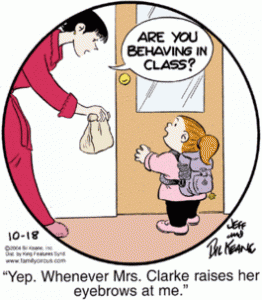Being Consistent 4
In my opinion being consistent is essential, possibly one of the most important parts of parenting. However, I also think it is one of the most difficult things to do consistently! (Trust me, I need this post all the time!)
Why Is It So Important
Being consistent is important for a few reasons. First of all, it gives you power, it can turn your words into gold! 🙂 (Who doesn’t want that?!) When you are consistent, your child(ren) learn quickly that you say what you mean and mean what you say. They soon discover that there are consequences for their actions and they will know what to expect. They learn to respect adults and often will carry this belief onto other adults. On the other hand, if you are not consistent, then the reverse is also true. Your words will have no power, your children will learn that you don’t mean what you say and that there are no consequences for not listening and following directions. Being inconsistent breeds disrespect, defiance, and apathy in children.
Being consistent helps your children feel safe and secure. I know this may sound a little off, but it’s true. Children thrive in an environment when they know they are loved enough that the adults in their lives will keep them safe. They know what to expect and what is expected of them. Also, the more strong willed the child is, the more this is true and necessary! Especially in the beginning, children may fight against it, however, there has been so much research out there that shows that children oftentimes push the limits to see what they can get away with and to see how much they are loved. I’ve read so many accounts on “difficult” teenagers and many of the teenagers said that they did certain things just to see if their parents really cared about them.
Rely On Others
It is so much easier for others to notice when we are being inconsistent than it is for us to notice. Talk to someone you trust and who has you and your children’s well being at heart and ask them to nicely tell you when they notice you being inconsistent. The next part is the hardest, when they do, do NOT get defensive, even if it makes you angry (trust me, this takes work!) Take their words to heart and step back and reflect. If you can really trust them, you know they are not being malicious, they are trying to help!
Counting
I know many parents who will make a request and then start counting. They get irritated that it takes their child so long to comply, however, this has been taught. The child knows they have until 3, 5, or 10 to do what they need to without a consequence. Now I know that younger children need time to process what we say, time to make a decision, and time to act on it. However, if they are taught that they can wait, then when they are 10, they will still expect this. If you must count, please count in your head.
Children are Good
Children are great at knowing when we are run down and tired. When we are irritable and cranky. These are the times that it’s essential as parents to be consistent. These are the times that it also takes every bit of will power we have to carry through. Once a child “wins” a battle of wills or is permitted an inch when they usually only get half an inch, changes everything. Just one misstep on our part can undo months of conditioning.
Tips
- make a chart or list (especially good for younger children) showing what the consequence will be for certain behaviors (natural consequences come in handy here)
- make sure you have already established and set expectations
- when you make a request, ask the child to tell you what will happen if they do not comply
- start with a few things and build up from there
Reality
Now I don’t believe that anyone on Earth can be 100%, 100% of the time. So take this into consideration. However, also tread lightly, because when you are not consistent, that means you will have to put in double the effort to get back on track! 🙂
Aspects That Are Hard For Me
For some reason, I think that consequences need to immediately bring discomfort or impact the child. This is not true, sometimes the best consequences are those that are not felt right away, I must remember this!
It’s also very difficult to be consistent when tired and irritable, I will sometimes let the kids have a pass when I’m feeling like this and I always pay for it later!
Challenge
Week 1: Read post and take a week to decide what 1-2 things you want to focus on being consistent about.
Week 2: Take the 1-2 things you thought about last week, decide how you are going to deal with it when they occur (consequences/reaction). Tell your children what will happen, make a chart or write it down if you need to. Then FOLLOW THROUGH. No matter how tired, stressed, etc you feel, when it happens, follow through with the action! Give power to your words! Say what you mean and mean what you say! Ready? GO!
Week 3: Reflect on how you did this past week on being consistent. Were you consistent? Were there times when you weren’t? If you struggled, try to figure out why and tweak your system to better work for you and your children. Make those changes and try them out this week. Did you do a great job and see progress in your children? If so, choose 2 more things this week, figure out the consequences, then stick to your guns and make it happen! Good luck!
Week 4: Reflect on how you did this past week on being consistent. Were you consistent? Were there times when you weren’t? If you struggled, try to figure out why and tweak your system to better work for you and your children. Make those changes and try them out this week. Did you do a great job and see progress in your children? If so, choose 2 more things this week, figure out the consequences, then stick to your guns and make it happen! Good luck!




-
-
4 years
Tagged books, coaching, finances, motherhood, parenting